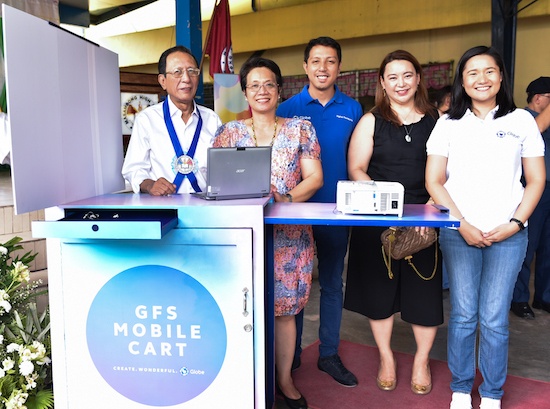Globe Telecom is supporting the 21st century learning of Quezon City high schoolers by providing information and communications technology tools.

Masambong High School officials with
Globe Telecom representatives together present the Global Filipino School mobile cart
Globe’s Global Filipino School (GFS) program has added Quezon City to its growing number of supported schools through the introduction of GFS to Masambong High School (MHS), the 1st public school in QC to benefit from the program.
Masambong High School’s 1,300 students and 65 teaching and non-teaching staff will now have access to the GFS e-library with infrastructure support and ICT equipment such as the Globe Digital Learning Lab – a mobile cart of ICT gadgets composed of Globe Prepaid Supersticks, charging station, netbooks, tablets, and projectors powered with superior internet connectivity.
The GFS Lab can be used to teach different subject matters whether inside or outside the classroom to encourage creativity, communication, collaboration, and critical thinking.
The Creative Space can, likewise, be used as a teacher training center for the DepEd Division of Quezon City as part of the partnership between Globe Telecom and DepEd. Under the program, MHS teachers were given training on how to seamlessly use internet connectivity and ICT tools in their subject expertise. The teachers in turn, are responsible for sharing the knowledge with neighboring schools as MHS will be serving as a teacher training hub for DepEd Division of QC on the use of internet connectivity and ICT tools in the classroom.
Yoly Crisanto, Globe Senior Vice President for Corporate Communications said of the inclusion of QC in its program: “Quality education goes hand-in- hand with ICT which allows learning to take place not only within the classroom but even beyond it. Mobile internet adoption and the availability of affordable data-capable gadgets make it easier now for both students and teachers to access a vast library of information previously out of their reach. We believe that by providing the teachers and students with the tools they need, we can help uplift the state of Philippine education one school at a time.”
Masambong joins the targeted 221 GFS schools to be provided with digital technology laboratories by 2020 as part of Globe’s mission to help bring its students and teachers towards compliance with the 21st Century Learning Framework.
|
|
The post Globe supports 21st century learning in QC public schools appeared first on Good News Pilipinas.